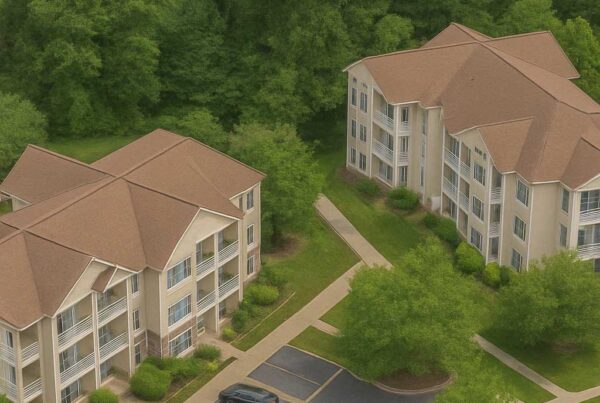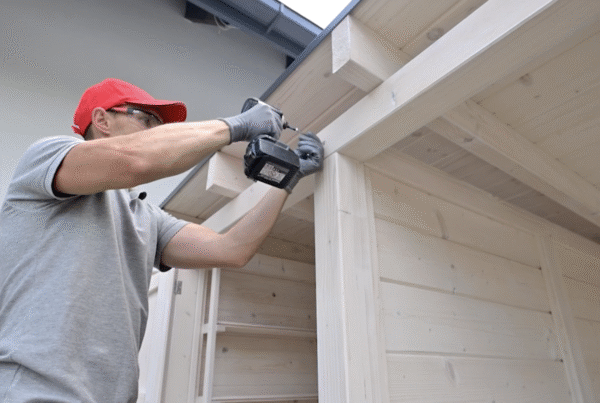As a condominium or townhouse owner, understanding HOA insurance coverage is crucial. Your Homeowners Association (HOA) buys insurance policies to protect themselves and their members from any potential liability or property damage. You don’t want to wait until there is loss to ask yourself- what does HOA insurance cover and not cover?
The best time to become familiar with this is before you purchase a home or condo so that you can be certain to purchase the correct insurance for your property prior to closing. You don’t want to find yourself without the proper protection or facing an uncovered claim. Homeowners Associations (HOAs) purchase insurance policies to protect them and their members from potential liability and property damage.
However, understanding what these policies cover and don’t cover is essential to have adequate protection in case of an incident.
Think of it like this: you wouldn’t jump into a pool without knowing how deep it is, right? The same goes for HOA insurance coverage. This way, you won’t be surprised if something unexpected happens.
Definition of HOA Insurance
HOA insurance is term used to describe what are in reality many separate policies that are typically needed for a homeowners association or condominium regime. Most often when referring to HOA Insurance what is meant is the Property Insurance, sometimes refered to as the Condo Master Building Policy, which covers property owned by the Association or property which it is required to insure under the declaration.
Homeowners associations often purchase various insurance policies to cover liability for events that may occur in common areas, amenities, and other shared spaces within the community. These policies may also cover cases of fraud or stolen funds, acts and omissions of directors, as well as injuries to volunteers.
Factors Affecting Condo Master Policy Insurance Costs
Let’s talk about the not-so-fun topic of rising condo insurance costs in Texas. So, it turns out that commercial property insurance for condos in Texas has been getting more expensive.
And when we say more expensive, we mean it’s been shooting up like a cactus in the desert. This trend isn’t limited to just one type of condo either – small complexes and high-rise buildings alike are feeling the heat.
Why the sudden increase in insurance costs, you ask? Well, it’s all thanks to mother nature. Texas has always been a bit of a natural disaster magnet, with hurricanes, tornadoes, floods, and wildfires making regular appearances. But lately, these disasters have been hitting harder and more frequently, causing major damage and racking up some serious repair costs. Frequent losses such as water damage claims are also driving rates up.
If that wasn’t enough, the price of construction materials and labor has also been on the rise. This has been happening all over the country, but it’s hitting Texas condo owners particularly hard. The demand for construction materials has skyrocketed, while supply has been limited due to a variety of factors like supply chain disruptions and labor shortages.
And you know what happens when supply goes down and demand goes up? Prices go up too!
Reassessing the Risk in Texas
To top it off, insurance companies are also reassessing their risk models for Texas condos as well as others situated along the Gulf Coast. They’re reevaluating their pricing and underwriting practices, which means higher premiums and deductibles for property owners. This is all in an effort to mitigate their risk and protect their bottom line.
It’s like the insurance companies are saying, “We’re not taking any chances with you, Texas.” So, what does this mean for condo owners? Well, it’s not great news. Association boards and unit owners are having a tough time balancing the need for adequate insurance coverage with the financial constraints of running a successful operation.
Some are reducing their coverage or accepting loss limits, while others are simply passing on the increased costs to the unit owners through higher assessments.
Unfortunately, it doesn’t look like this trend is going to reverse anytime soon. The pressure to increase building valuations and a limit in underwriting capacity will likely keep pricing firm.
How Rise is Helping HOAs Save Money on Insurance
Thankfully here at Rise AMG we offer the RISE Master Insurance Program. The aim is to help clients manage the increasing costs and limited coverage of community association insurance due to various adverse factors. We’ve actually helped our properties save over $1 million in premiums.
RISE uses its expertise in risk mitigation and prevention as well as insurance to leverage capacity from insurance carriers with better than standard pricing, terms, and deductibles for our customers. The program has a “master policy” that covers multiple Named Insureds. Each with its separate limits and locations listed under the same umbrella policy.
This program satisfies lender Insurance Code Affiliation requirements, and participation is subject to underwriting eligibility, insurance carrier agreement, and at the sole discretion of RISE clients with an active Master Services Agreement (MSAs).
Flood and earthquake coverage has limits to how much they can pay out, and the policy does not replace separate NFIP Flood Insurance or Earthquake coverage. This is why it’s crucial to know what your HOA insurance covers and what it doesn’t.
Importance of Understanding What is Covered and Not Covered
Knowing what your HOA insurance policy covers is essential to avoid any unexpected costs or legal issues in case of an incident. Many homeowners assume that their individual homeowner’s insurance policy covers all damages, but this is not always the case.
Understanding the coverage provided by your HOA insurance policy can help you determine whether you need additional coverage and avoid any potential coverage gaps.
HOA Insurance Coverage
HOA insurance coverage typically includes four types of coverage: property, liability, D&O, and master policies. Here is an overview of each type of coverage:
- Property Insurance: This type of coverage protects common areas, amenities, and buildings against damage or loss due to covered events such as fire, lightning, and windstorms. Property insurance typically covers the cost of repair or replacement of damaged property.
- Liability Insurance: Liability insurance protects the association and its members from potential lawsuits due to bodily injury or property damage that occurs in common areas or as a result of the association’s activities. This coverage typically includes medical expenses, legal fees, and damages awarded in a lawsuit.
- D&O Insurance: Directors and Officers (D&O) insurance provides liability coverage for the association’s board members and officers in case of legal action against them for decisions made in their official capacity. This type of insurance protects the board members and officers from personal financial loss due to lawsuits.
- Master Policy Insurance: A master policy is a combination of property and liability coverage purchased by the HOA to protect the entire community. This policy covers shared spaces and amenities, as well as individual units. Master policy coverage typically includes property damage, bodily injury, and legal liability.
If you would like more information on navigating these different forms of coverage we are happy to help. At RISE Association Management Group, we specialize in providing comprehensive management services exclusively tailored to condominium and townhome associations in Houston and the surrounding areas.
To further explore and guide you, we’ll break down what the different types of insurance protect.
What Does HOA Property Insurance Cover?
HOA property insurance covers common areas, buildings, structures, and amenities against damage or loss due to covered events such as natural disasters, fire, theft, and vandalism. This insurance policy typically covers the cost of repair or replacement of damaged property.
Limits and exclusions of coverage vary depending on the specific insurance policy purchased by the HOA. It’s essential to review the policy details to understand the specific coverage limits and exclusions.
What Does HOA Liability Insurance Cover?
HOA liability insurance provides coverage for bodily injury or property damage that occurs in common areas or as a result of the association’s activities. This coverage typically includes medical expenses, legal fees, and damages awarded in a lawsuit.
HOA liability insurance does not cover intentional or criminal acts or damages caused by a member’s negligence. The specific limits and exclusions of coverage vary depending on the policy purchased by the HOA.
What Does A Master Condo Property Policy Cover?
Condo Property insurance is similar to other building insurance policies, but it may include specific coverage for condo associations and is often required to cover any property that the Association is responsible to insure under the condominium declaration. This may include coverage for shared spaces and amenities, such as hallways, elevators, and swimming pools but can often extend to even covering individual units.
There is at least one major distinction between the condo building insurance and other policies: it does not included insurance for belongings within individual units nor does it cover additional living expenses for displaced owners. This type of coverage is typically included in the Unit owner insurance.
It’s important to note that the specific coverage and limits of a condo HOA insurance policy may vary depending on the policy purchased by the HOA. Homeowners within the association still need to purchase their own individual insurance policies to protect their personal property.
What Does HOA Master Insurance Cover?
HOA master insurance is a type of policy that covers both individual units and common areas within an HOA community. This type of policy is typically purchased by the HOA to ensure that all areas within the community are adequately protected.
Coverage provided by an HOA master policy may include:
- Liability coverage for common areas, such as walkways, parking lots, and community centers
- Property coverage for common areas, such as buildings, amenities, and landscaping
- Coverage for damage caused by natural disasters or other catastrophic events
- It is essential to be aware that the coverage and limits of an HOA master policy can differ. This depends on the particular policy the HOA has purchased.
What Does HOA D&O Insurance Cover?
Directors & Officers (D&O) insurance is a type of coverage that provides protection for the board members of an HOA. This insurance protects board members from personal liability if they get sued. It is specifically designed to cover actions taken while representing the HOA.
Coverage provided by an HOA D&O insurance policy may include:
- Defense costs for lawsuits against board members
- Settlements or judgments in lawsuits against board members
- Coverage for employment-related claims, such as wrongful termination or discrimination
- It is important to remember that the coverage and limits of an HOA D&O insurance policy may differ. This depends on the policy chosen by the HOA.
Guide to HOA Insurance Coverage in Texas
Texas requires HOAs to maintain specific insurance coverage. The association’s size and type can determine its coverage requirements.
Some of the most common types of insurance coverage required include:
- Property insurance for common areas and buildings
- Liability insurance for common areas and board members
- Workers’ compensation insurance for employees of the HOA
It’s important for HOAs in Texas to carefully consider their insurance needs and work with an experienced insurance provider to ensure that they have the appropriate coverage in place.
5 Things Everyone Should Know About Condominium Insurance Before Buying in Texas
If you’re eyeing a condominium in Texas, understanding insurance is crucial. Condo HOA insurance is similar to homeowners insurance, but there are some key differences to grasp. Here are five things to keep in mind:
- Get the scoop on association vs. individual policies: As a condo owner, you’re responsible for insuring the stuff inside your unit and any upgrades you or the previous owner made. The association’s policy, on the flip side, covers common areas like hallways, elevators, and the pool. In Texas, the Texas Uniform Condominium Act states that condos with stacked units may have extra responsibilities under the master insurance policy. It’s a smart move to ask the association’s insurance agent about what each policy covers, so you know you’ve got the right amount of coverage. Rule of thumb: Always have at least a HO-6 Condominium Unit Owners policy that covers your unit, upgrades, personal belongings, and additional living expenses if something goes wrong.
- Think about loss assessment coverage: Brace yourself, because as a condo owner, you might have to chip in for some losses suffered by the association. This is called “loss assessment,” and it can hit you hard if there’s a major catastrophe. Luckily, there’s an optional coverage called loss assessment coverage that can help shield you from those unexpected expenses.
- Watch out for deductibles: Just like any insurance policy, there might be a deductible you have to pay for before your coverage kicks in. Make sure you know your deductible and how it applies to your policy.
- Understand your liability coverage: Your insurance will come with liability coverage, which can save your bacon if someone gets hurt in your place or you accidentally damage someone else’s property. It’s important to have enough liability coverage to safeguard your assets in case of a lawsuit.
- Know your rights and responsibilities: As a condo owner in Texas, you’ve got certain rights and responsibilities when it comes to insurance. According to the Texas Uniform Condominium Act it requires condo associations to give up their right to seek reimbursement from you for losses covered by their policy. However, it’s still your duty to make sure you have the right amount of coverage for your unit. You might still have to pay deductibles, damage assessments, or fines if your actions or omissions cause a loss.
By getting a handle on these five key suggestions, you’ll be all set to protect yourself and handle any unexpected expenses that come your way.
Remember that at RISE Association Management Group, we specialize in providing expert management services for condominium and townhome associations, including assistance with insurance coverage and risk management.
We’re here to help your association and even offer a comprehensible Master Insurance program for a reasonable rate so save you money. Contact Rise today and learn more about our services and how we can help your community thrive.
In conclusion, understanding the insurance coverage provided by your HOA is essential for protecting your home and personal property.
Frequently Asked Questions
What is exactly is HOA insurance?
HOA insurance is term used to describe what are in reality many separate policies that are typically needed for a homeowners association or condominium association. Most often when referring to HOA Insurance the Property Insurance, however, there are many other types of insurance policies purchased by a homeowners associations to liability for events in the common areas, amenities, and other shared spaces in the community, fraud or stolen funds, acts and omissions of directors, as well as injury to volunteers.
What is an HOA master policy?
An HOA master policy is a type of insurance policy that covers both individual units and common areas within an HOA community. This type of policy is typically purchased by the HOA to ensure that all areas within the community are adequately protected.
What is not normally covered by homeowners insurance?
Homeowners insurance typically does not cover damage caused by floods or earthquakes. It also may not cover damage caused by wear and tear, mold, or pests. You can purchase separate flood or earthquake coverage. Some policies will also include limited mold or fungi coverage.
Which of the following are typically covered by homeowners insurance?
Homeowners insurance typically covers damage to the structure of the home, personal property, liability protection, and additional living expenses in the event that the home becomes uninhabitable due to damage.







